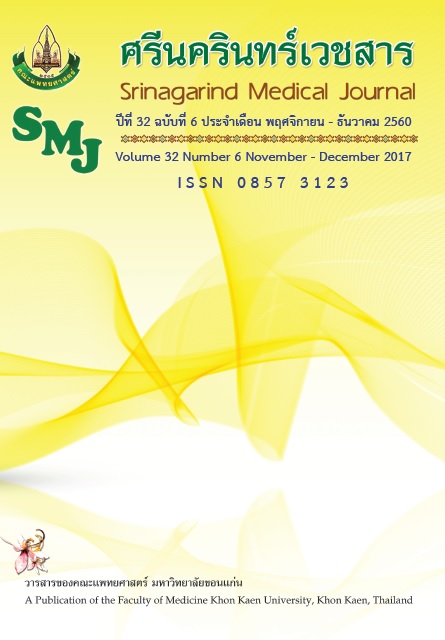The Need For Live-in Caregiver When Instrumental Activities of Daily Living (IADL) is Impaired: from the Fully Functioned Elder’s Perspective
Keywords:
Elderly; Care-giver; Loss of ability; ผู้สูงอายุ; ผู้ดูแล; การสูญเสียความสามารถAbstract
Background and objectives : Current Services for the elderly based on the assessment by medical personnel might not be consistent with the needs of the elderly. The purpose of this study was to examine the needs of caregivers among these elderly when they lacked the ability to perform routine instrumental activities of daily living.
Methods :228 well elder living in to Pakchong Municipality Community Health Center (Nongkaja), Pakchong Sub-District, Pakchong District, NakhonRatchasima Province were recruited and self administered questionnaire were employed.
Results :Only 37.3% of the elderly without illness felt that they are in need of caregivers. 62.7% do not need caregivers.When they lose their ability to perform their daily activities, the elderly need help with food preparation with the highest percentage 63.2%, home and clothing cleaning 46.1 percent, and helped to prepare and to administer the drug, 43.0%. The elderly thought that when they are ill care should be given. The most illness that needed the care is the stroke at 46.5%. And family members are the preferred choice of care-giver.
Conclusion :Due to the diversity of the needs of older people, health care personnel can lead to careful planning of elderly care with family involvement when the elderly lose their ability to cook , cleaning capabilities and prepare medicine
หลักการและวัตถุประสงค์:ปัจจุบันการบริการสำหรับผู้สูงอายุตามการประเมินของบุคลากรทางแพทย์อาจสอดคล้องกับความต้องการของผู้สูงอายุ การศึกษาในครั้งนี้จึงมีวัตถุประสงค์เพื่อศึกษาความต้องการผู้ดูแลในบ้านในมุมมองของผู้สูงอายุ เมื่อขาดความสามารถในการช่วยเหลือตนเองในกิจวัตรประจำวันโดยใช้อุปกรณ์
วิธีการศึกษา: ศึกษาในผู้สูงอายุกลุ่มติดสังคมของเขตพื้นที่ของศูนย์สุขภาพชุมชนเทศบาลเมืองปากช่อง 1 (หนองกะจะ) ตำบลปากช่อง อำเภอปากช่อง จังหวัดนครราชสีมา จำนวน 228 ราย โดยใช้แบบสอบถามชนิดตอบเอง
ผลการศึกษา : ผู้สูงอายุที่ไม่มีภาวะเจ็บป่วยหรือผู้สูงอายุกลุ่มติดสังคม ในปัจจุบันต้องการให้มีผู้ดูแลอาศัยอยู่ด้วย ร้อยละ 37.3 ไม่ต้องการ ร้อยละ 62.7 เมื่อสูญเสียความสามารถในการปฏิบัติกิจวัตรประจำวันผู้สูงอายุมีความต้องการผู้ดูแลช่วยเรื่องการเตรียมอาหารมากที่สุดคิดเป็นร้อยละ 63.2 การทำความสะอาดบ้านและเสื้อผ้า ร้อยละ 46.1 และช่วยเตรียมและช่วยให้รับประทานยาตรงเวลาร้อยละ 43.0 ผู้สูงอายุคิดว่าควรมีผู้ดูแลคอยดูแลโดยเมื่อป่วยเป็นอัมพาตมากที่สุดร้อยละ 46.5 และมีความต้องการบุคคลในครอบครัวเป็นผู้ดูแลมากที่สุด
สรุป: เนื่องจากความหลากหลายในความต้องการของผู้สูงอายุกลุ่มติดสังคมในพื้นที่กลุ่มนี้ ทำให้บุคลากรด้านสาธารณสุขสามารถนำไปสู่การวางแผนการดูแลโดยการมีส่วนร่วมของครอบครัวเมื่อผู้สูงอายุสูญเสียความสามารถในการประกอบอาหาร ความสามารถด้านการทำความสะอาด หรือด้านการจัดยารับประทาน




